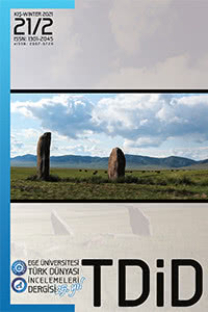Tiyatro Eserlerinde Oyun Kisisi Olarak "Atatürk"
Birçok Türk büyüğü gibi, Mustafa Kemal Atatürk ve onun mücadelelerle geçen hayatı da tiyatro eserlerinde konu olarak işlenmiştir. Milli mücadele dönemini ve Cumhuriyet sürecini aktarmayı amaçlayan eserlerde, genellikle, Atatürk’ün bu süreci yönlendiren idarî ve manevî gücünden dolaylı olarak bahsedilir. Atatürk’ün doğrudan doğruya bir oyun kişisi olarak yer aldığı eserler ise daha çok onun, özel ve siyasî hayatını, dünya görüşünü anlatmayı amaç edinen çalışmalardır. Türk tiyatro tarihinde bu türden eserlerin sayısı oldukça azdır. Atatürk hayatta iken kaleme alınan eserlerde, Atatürk’ü sahnede temsil etmek konusunda bir çekingenliğin yaşandığı görülür. Cumhuriyet’in ilânından sonraki yıllara damgasını vuran eserler ise tek bir kalemden çıkmışçasına benzer özellikler gösteren ‘İnkılâp Temsilleri’dir. Seyirciyi düşündürmekten ziyade, resmî doğruları öğretmek için yazılan bu tek boyutlu eserler, Atatürk’ü bir destan kahramanı gibi idealize ederek yansıttıkları için işlevini gerçekleştiremeyen başarısız çalışmalaradır. Ancak 1960’lı yıllardan sonra, ‘Tarih’ anlayışının gelişmesi ve zaman bakı- mından yeterli mesafenin sağlanması ile birlikte, ‘Atatürk’ bir oyun kişisi olarak sahneye çıkmaya başlamış, Atatürk konulu eserlerdeki destanî üslûp yerini yavaş yavaş realist üslûba bırakmaya başlamıştır. Türk tiyatro eserlerinde, kişilere ve olaylara bakış açısında kendini göstermeye başlayan bu realist yaklaşım, henüz olgunlaşmamıştır, kendini tamamlamamıştır.
Anahtar Kelimeler:
Atatürk, Tarihî tiyatro, Milli M ücadele, Kurtuluş Savaşı, Tiyatroda oyun kişisi.
“Atatürk” as a Character of Plays
Like many great Turks, Mustafa Kemal Atatürk as well as his life spent constantly struggling has been a subject matter of theatrical plays. In plays aimed at conveying Turkish National Struggle for Independence and the Republican period, Atatürk’s administrative and spiritual powers governing this period are usually mentioned indirectly. And, the theatre plays showing Atatürk as a direct character aim to convey his private and political life as well as his world view. In the history of Turkish theatre, such plays are relatively few. In the plays written when Ataturk was alive, there seems to be timidity to represent Ataturk on the stage. The plays which left a mark on the years following the proclamation of the Republic are ‘Revolution Performances’ showing similar features as if they are the works of a single pen. As these one-dimensional plays written to teach the official truth to the audience rather than make them think, reflect Atatürk by idealizing as an epic hero, they are unsuccessful plays which failed to realize their functions. However, after the 1960s, with the development of the sense of ‘History’ and by getting over the time, ‘Ataturk’ began to get on the stage as a character. And, the epic style in the plays on Atatürk was slowly replaced by a realist style. In the Turkish theater plays, this realist approach that has come into prominence in the perception of people and events has not matured and completed, yet.
Keywords:
KeywordsKeywordsCharacters in theatre plays,
- ISSN: 1301-2045
- Başlangıç: 1996
- Yayıncı: Ege Üniversitesi Türk Dünyası Araştırmaları Enstitüsü
Sayıdaki Diğer Makaleler
Suriye Krizinin Küresel ve Bölgesel Politik Dinamikler Üzerine Etkisi ler Üzerine Etkisi
Sertif DEMİR, Carmen RIJNOVEANU
Tiyatro Eserlerinde Oyun Kisisi Olarak "Atatürk"
Atatürk'ün Cenaze Merasimi Sırasında Türkiye'de Yapılan Matem Törenleri
Haçlı Seferleri Zamanında Avrupa'da Antisemitizm (1096- 1190)
Tiyatro Eserlerinde Oyun Kisisi Olarak "Atatürk"
“Kök Tengri’nin Çocukları (Avrasya Bozkırlarında İslam Öncesi Türk Tarihi)”
The Impact of the Syria Crisis on the Global and regional political dynamics
Carmen RIJNOVEANU, Sertif DEMİR
Nahçivan Arkeolojik Yapılarında Ortadoğu Kültürünün İzleri
SAÇIN BÜYÜ YAPMA ÖZELLİĞİ VE ÖZBEK HALK MASALLARINDA ELE ALINMASI
